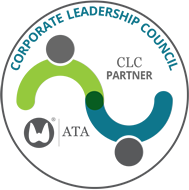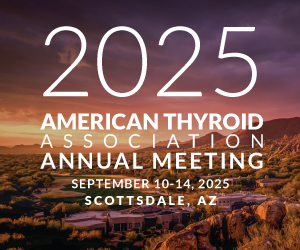Purpose and Principles
To further the mission of the American Thyroid Association (ATA) “The ATA leads in promoting thyroid health and understanding thyroid biology”, productive interactions with other non-profits and for-profit entities are essential. A guiding principle of non-profit organizations is to collaborate and cooperate with public and private entities, casting a wide net of influence and awareness. As stated in the goals of the ATA (found online http://www.thyroid.org/about-american-thyroid-association), we encourage and depend upon broad based support from industry to fulfill our scientific and educational missions. Our efforts in scientific inquiry, clinical excellence, public service, education, collaboration, and collegiality have made us the leading organization focused on thyroid biology and the prevention and treatment of thyroid disorders through excellence and innovation in research, clinical care, education, and public health.
It is in the interest of the ATA to provide a forum for open communication between the ATA and the community of corporations that share interest in thyroid health, disease and biology. This forum of corporate leaders is designed as a mechanism to help the ATA better serve its members and reach its organizational goals; therefore, would not be conducive to sales and marketing activities which must be restricted to the commercial outlets of the exhibit halls (in person and virtual online). In striving to promote discussion about thyroidology among the medical, scientific, and business leadership of related industry partners, the ATA hopes to increase and expand its capacity to:
- Improve prevention, detection, and treatment of thyroid disease,
- Advance research on thyroid molecular and cell biology, physiology, and diseases
- Support education of physicians, scientists, and other health professionals, and
- Promote effective advocacy and public policy that benefits patients and the public.
It is also in the interest of those private and for-profit organizations with an interest in thyroid health and disease to participate in such communications. Benefits to industry include:
- Access to experts in every field of thyroid research
- Insight into the relevant areas of uncertainty in thyroid health and disease
- Understanding of trends in management of patients with thyroid disease
- Early recognition of research paths that might lead to commercial opportunities
Our hope is to enable a robust exchange of ideas to further collegiality and advancement of thyroidology.
The ATA CLC (Corporate Leadership Council) will be guided by the mission, vision, values, and goals of the ATA and will be conducted transparently. In addition to adhering to the ATA Conflict of Interest and Code of Conduct Policy, the CLC will abide by the standards established by the Accreditation Council for Continuing Medical Education (ACCME), the AdvaMed guidelines, the American Medical Association’s Ethical Opinion on Continuing Medical Education
and Gifts to Physicians, the Food and Drug Administration regulations regarding Industry-supported Scientific and Educational Activities, the Office of Inspector General Compliance Program Guidance for Pharmaceutical Manufacturers, and the PhRMA code on Interactions with Healthcare Providers. It is the responsibility of each participant to be familiar with these standards.
Key considerations of the ATA include complete independence in organizing and planning the content development of all educational programs. Appropriate funding of educational programs mandates a sharp divide between potential funding and the decision-making of the program committee. All funding proposals are generated from the ATA headquarters’ staff within the Accreditation Council for Continuing Medical Education (ACCME) guidelines and regulations; requests are submitted to multiple industry and commercial companies; and, disclosure and processes are transparent to participants and sponsors.
Antitrust
Antitrust: The Sherman Act, the Robinson-Patman Act, the Clayton Act and the FTC Act are among the major federal antitrust laws prohibiting all contracts, combinations or conspiracies to restrain trade. Not-for-profit organizations that improperly deny or expel members, set standards, sponsor certification programs, endorse products or services or otherwise advantage or disadvantage individuals or organizations may find themselves in violation of antitrust laws. Even discussion of collective action, pricing or other issues that could lessen or increase competitive advantage can subject the association to litigation and fines.
Organization officers and directors must maintain control of meetings, at least to the degree that participants do not engage in conversation and/or activities which violate these laws.
Conflicts of Interest
Conflicts of Interest: State laws define this issue in different ways. However, all of these laws essentially prohibit individuals using their positions in not-for-profit organizations to advantage themselves or anyone other than “the membership.” In other words, it must be the organization’s purpose and the officer’s and director’s purposes to serve the “common good” of all or the majority of members, and they must not seek to advantage themselves or any minority at the expense of the majority.
Confidentiality
Confidentiality: CLC activities and discussions shall be conducted in a manner that encourages and ensures confidentiality and trust. CLC members who fail to be candid and/or maintain confidences may be removed from the CLC.
Firewall Policy
Firewall Policy: The programs of the CLC are not related to the ACCME accredited scientific and educational programs of the ATA, and as such, the corporate partners would not be involved nor exert influence on topics or speakers of accredited ATA meetings.
Code of Conduct Agreement
Members of the ATA Corporate Leadership Council (CLC) code of conduct agreement:
- Carefully listen, consider and respect the opinions of fellow CLC members;
- Respect and support all majority decisions of the CLC;
- Keep well-informed of developments relevant to issues that may come before the CLC;
- Participate actively in CLC meetings and actions and not discuss elsewhere what they are unwilling to discuss in CLC meetings;
- Bring to the attention of the CLC any issues they believe will have a significant effect on the CLC, the ATA, or those we serve;
- Attempt to interpret the needs of all those we serve to the CLC;
- Use the forum to discuss issues in thyroidology and not product/services marketing;
- Acknowledge conflicts of interest between their personal and professional life and their position on the CLC; and,
- Maintain a professional and collegial approach to CLC discussions and decisions.
Confidentiality Definitions and Agreement
“Confidential Information” shall mean all information whether written, oral, visual, graphic, electronic or by way of demonstration, including product and research information, proprietary information, protocols, structures, models, techniques, trade secrets, know-how, processes, projections, data, employees, business and contractual relationships disclosed by CLC member (or obtained by either Party through observation or examination), whether or not such foregoing information is identified at the time of disclosure or is marked as “confidential” or “proprietary”.
Information which is orally or visually disclosed shall constitute Confidential Information if it would be apparent to a reasonable person, familiar with business and the industry in which it operates, that such information is of a confidential or proprietary nature.
Members of the ATA Corporate Leadership Council (CLC) confidentiality agreement:
- Acknowledge that Confidential Information is proprietary information that will be protected by CLC members.
- Respect Confidential Information using the same degree of care as it uses to protect its own confidential information of similar importance, but not less than reasonable care.
- Not disclose any Confidential Information or any information derived therefrom to any third parties.
- Not use any Confidential Information at any time except for the purposes of the Corporate Leadership Council; and immediately notify CLC members in writing upon discovery of any loss or unauthorized disclosure of the Confidential information.
CLC Statement of Principles for Saving and Printing (PDF File, 177 KB)




